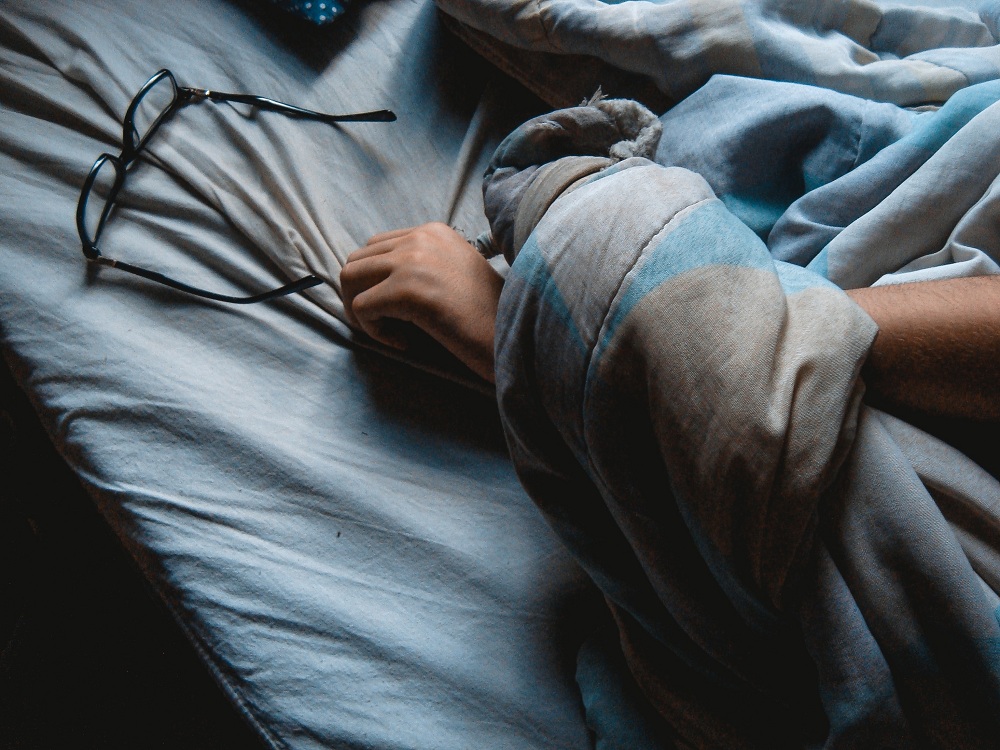WHY YOUR SLEEPING PILLS ARE NOT HELPING YOU SLEEP
8 min read
Photo by Matheus Vinicius on Unsplash
So it’s been a long day, and you get back home bent over, feeling spent. It’s going to be another short night, you figure. Or maybe a long one, depending on which side of the coin you belong. Either your eyes are going to stubbornly stay open through the night, only to close some few hours away from the time you are supposed to be awake, as annoying and stressful as it is. Or, on the other side of the coin, you are going to toss and turn with a million thoughts running through your head until the annoying sound of your alarm climaxes your sleep dilemma.
YOU ARE NOT ALONE
If you are can relate to this, then you are not alone. Many other people have been and are experiencing this same condition, and in even worse ways too. To put it in perspective, it is statistically estimated that some twenty to thirty million Americans are suffering from insomnia at a chronic level, along with various intermittent sleep problems annually.
“We are currently facing an epidemic of sleep deprivation in the US.” Doctor Tomkinson
At a Consumer Report survey carried out on 1767 adults from the United States as of July 2018, close to one-third of them (about 80%) indicated that they suffered sleep deprivation at least once a week. According to a report by the American Sleep Apnea Association, at least 80 different sleep disorders come up as the results for the diagnosis of over 50 million US citizens annually.
So this is disturbing and certainly needs to be looked at. Of course, being deprived of sleep is the worst, and so I can understand your frustration. In the 15th Century, a man named Hippolytus de Marsiliis, an Italian lawyer, is said to have documented the use of sleep deprivation as a way of punishing prisoners? Cruel right? And yet, this age-old phenomenon of men being “unjustly” deprived of sleep still lingers today, being “punished” more by other factors than by an intentional act.
AN EXPENSIVE HELP
And so it only makes sense that some sort of help is sought in that regard to make the journey into one of the few places we get some kind of peace from all the noise-the dreamland- a smooth one. That must be why the sleep aid and remedy industry generated total revenue of $78.7 billion in 2019 and is predicted to reach up to $162.5 billion by 2030. And even now, the market keeps rising at a CAGR progress of 7.1% from 2020.
And so you decide to go in for the big guns. The bags are forming under your eyes, and sleep deprivation is taking its toll on you. You turn to different forms of sleep aid resources available to you; the best and most comfortable mattresses and pillows you can afford, the sleep apnea devices, and then there are the pills. The pills! You manage to lay hands on some sleep aid medication. With this, you are spoilt for options. Well, that is as far as your medical advice is concerned.
TYPES OF SLEEPING DRUGS
To kick things off, you would probably go for the over-the-counter drugs (of which most rely on older antihistamines) such as diphenhydramine (Sominex, ZzzQuil, and generic) or doxylamine (Unisom SleepTabs and generic). Otherwise, you are given prescription drugs such as:
- Benzodiazepines or “Benzos” [examples being temazepam (Restoril and generic) and triazolam (Halcion and generic)] are anti-anxiety drugs. They work by essentially sedating you and slowing down the activity of the brain and nervous system.
- So-called Z drugs, such as eszopiclone (Lunesta and generic), zaleplon (Sonata and generic), and zolpidem (Ambien, Edluar, Intermezzo, Zolpimist, and generic), which act like the Benzos but target selective brain receptors.
- More modern forms of prescription sleep drugs are called ramelteon (Rozerem) and suvorexant (Belsomra). These influence brain chemicals which regulate the sleep-wake cycle.
You take them in that night, and what a night! You sleep like a baby. This is it! This is the solution. Well, it is until either of two things begin to happen:
- It stops working like it used to be before
- It starts to make you feel worse than you were before.
The sleeping pills seem to be using your sleep against you.
What happened?
SIDE EFFECTS AND MISUSE
One major reason why sleeping pills may not be working is because of their side effects. Sleeping pills have limited benefits and are notorious for their side effects which can do more harm than good. Some of the many side effects include changes in appetite, headaches, changes in the menstrual cycle, morning drowsiness, etc. In this case, these side effects develop the potential of interfering with your sleep.
The reason for the prominence of these side effects is usually because the medication is taking for more extended periods. And most of these complications result from taking these medications in potentially harmful ways. According to a survey, it was discovered that 40% of people who use sleep medications do not use them appropriately. Such inappropriate methods include taking them for longer periods or taking them along with alcohol and other medications.
Sleeping pills are only meant to be used for relatively shorter durations. And even so, you are not spared the side effects. Most people end up feeling terrible from a rather unrefreshed sleep from the night before to a day compromising of confusing moments, forgetfulness, and even sometimes feeling drowsy while driving.
“Prescription sleep medication should be used sparingly and for a short time. They should act as a bridge to get the patient sleep while they build good sleep habits.” Doctor Tomkinson
TOLERANCE
Again, most times, sleeping pills can stop working because your body has developed a tolerance for them. This necessitates that you get more doses or a different medication. And this can mess with your sleep pattern.
THE REBOUND EFFECT
Another reason why you may find it difficult getting your sleep medication to work is a phenomenon called a “rebound effect.” This happens when you decide to lower or stop using your current medication (especially without the advice of a physician). This can cause a serious recurrence of your insomnia.
TIME FOR A DIFFERENT PERSPECTIVE
To put it on a lighter note, sometimes the reason why your sleeping pills seem not to be working like they are supposed to be is simply because your problems are bigger than the potency of the medication. This means you may not be addressing the real issue, looking for the pills to serve as a form of escapism. Sleep medications do not take responsibility for the changes that we need to make personally, such as dealing with anxiety or emotional difficulties at the root level. Most times, we will need to embark on a specific form of therapy and lifestyle changes in addition to the medication for them to work.
“Sometimes, the best medicine is a listening ear, a good cry, and sound advice. Therapy works.” Doctor Tomkinson
YOU HAVE TO MEET THE REQUIREMENTS
According to a study in the American Journal of Public Health (PDF) in 2015, after considering the medical and driving records of some 410,000 adults, it was realized that people who have been prescribed sleeping medication have twice the likelihood of being involved in a car crash. The primary cause of this being that most people who take sleeping pills are up 4 or 5 hours later. And this is a time when the drug is still circulating in their blood. It would have to take not less than 7 to 8 hours for the drug to leave their system. Thus it becomes clear that people who have less than 7 hours to spare for sleep will have sleeping pills doing them more harm than good.
AVOID ASSUMPTIONS
Sometimes a simple case of misinformation or unhealthy assumptions can cause us to misuse sleep medications, thus diluting their function. Most people go for OTC sleeping medication, assuming that they know how to use it. Sleeping pills must be taken as seriously as the directions that come with them. Some 40% of respondents who took an OTC sleep drug indicated that they felt drowsy the next morning, compared with 32% who took a prescription drug.
A WAY AROUND PILLS
“Use medication when necessary but don’t make it a lifetime relationship.” Doctor Tomkinson
There are several ways to go around a sleep medication, considering the many issues that come with its usage.
In one practical step, the American College of Physicians recommends a traditional therapy, a type of cognitive therapy termed as CBT-I. This method facilitates sleep restriction (only going to bed when you are sleepy). Essentially, you reprogram your brain to adjust its interpretation of sleep properly.
How this works is that you lie in bed for 20 minutes. If you cannot sleep after those 20 minutes, you get out of bed and enter a different room. Dim the lights in this room and read a book. Return to bed only when you start to feel sleepy. This method trains your brain to understand that your bed is a place for sleep and not to keep you awake.
Other steps to employ in ensuring a lifestyle change and good sleeping habits involve:
- Create a sleeping schedule and stick to it.
- Avoid alcohol or large meals before bedtime.
- Cut back on or avoid coffee, chocolate, or soda, especially before bedtime.
- Exercise as much as possible.
- Understand, interpret and develop the skills of managing stress
- Contact a physician when you are sleeping pills and begin to experience chronic fatigue, difficulty focusing, confusion, or severe stomach upsets.
DISCLAIMER: The author of this article is not a medical professional. This article should not be construed as medical advice.
Medical Disclaimer: The information in this article is not meant for diagnostic purposes, and we are not doctors. Please consult your doctor before making any decisions concerning your healthcare.
REFERENCES
23, T. A. O. (2020, January 24). The scientific reason sleeping pills don’t work. Well+Good. https://www.wellandgood.com/sleeping-pills-give-bad-quality-rest/.
Carr, T. (n.d.). The Problem With Sleeping Pills. Consumer Reports. https://www.consumerreports.org/drugs/the-problem-with-sleeping-pills/.
Consumer Reports. (n.d.). Why Americans Can’t Sleep. Consumer Reports. https://www.consumerreports.org/sleep/why-americans-cant-sleep/.
Healthline Media. (n.d.). Medical information and health advice you can trust. Healthline. https://www.healthline.com/.
Insomnia: When Sleeping Pills Don’t Work. Mental Help Insomnia When Sleeping Pills Don’t Work Comments. (n.d.). https://www.mentalhelp.net/blogs/insomnia-when-sleeping-pills-don-t-work/.
Markets, R. and. (2020, November 19). Global Sleeping Aids Market Report 2020: Market Generated a Revenue of $78.7 Billion in 2019 and is Expected to Reach a Value of $162.5 Billion by 2030. https://www.prnewswire.com/news-releases/global-sleeping-aids-market-report-2020-market-generated-a-revenue-of-78-7-billion-in-2019-and-is-expected-to-reach-a-value-of-162-5-billion-by-2030–301176912.html.
MediLexicon International. (n.d.). Sleeping difficulty: Causes, treatments, and more. Medical News Today. https://www.medicalnewstoday.com/articles/327339#causes.
Morris, M. (2020, February 28). Sleeping pills don’t actually help you sleep, or put you to sleep at all. Metro US. https://www.metro.us/sleeping-pills-dont-actually-help-you-sleep-or-put-you-to-sleep-at-all/.
Sleeping Pills: Types, Side Effects & Treatment. Cleveland Clinic. (n.d.). https://my.clevelandclinic.org/health/drugs/15308-sleeping-pills.
Volume 7. How Products Are Made. (n.d.). http://www.madehow.com/Volume-7/index.html.
WebMD. (n.d.). How Sleeping Pills Work: OTC and Prescription Drugs. WebMD. https://www.webmd.com/sleep-disorders/features/sleeping-pills-what-need-know.





